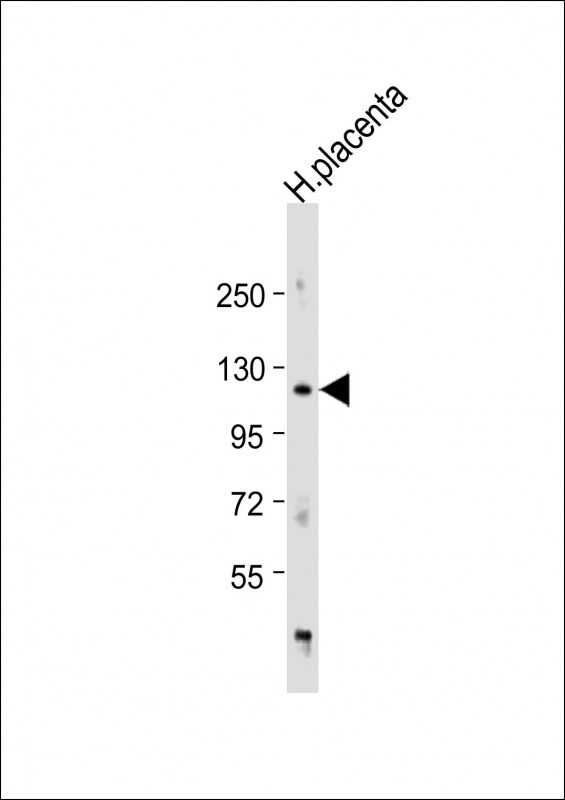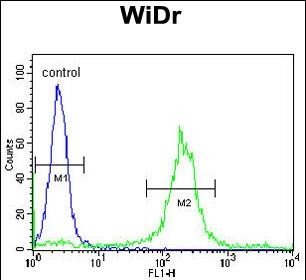ADAM19 Antibody (Center)
Purified Rabbit Polyclonal Antibody (Pab)
- SPECIFICATION
- CITATIONS: 1
- PROTOCOLS
- BACKGROUND

Application
| FC, IHC-P, WB, E |
|---|---|
| Primary Accession | Q9H013 |
| Reactivity | Human |
| Host | Rabbit |
| Clonality | Polyclonal |
| Isotype | Rabbit IgG |
| Calculated MW | 104997 Da |
| Antigen Region | 207-236 aa |
| Gene ID | 8728 |
|---|---|
| Other Names | Disintegrin and metalloproteinase domain-containing protein 19, ADAM 19, 3424-, Meltrin-beta, Metalloprotease and disintegrin dendritic antigen marker, MADDAM, ADAM19, MLTNB |
| Target/Specificity | This ADAM19 antibody is generated from rabbits immunized with a KLH conjugated synthetic peptide between 207-236 amino acids from the Central region of human ADAM19. |
| Dilution | WB~~1:1000 IHC-P~~1:50~100 FC~~1:10~50 |
| Format | Purified polyclonal antibody supplied in PBS with 0.09% (W/V) sodium azide. This antibody is prepared by Saturated Ammonium Sulfate (SAS) precipitation followed by dialysis against PBS. |
| Storage | Maintain refrigerated at 2-8°C for up to 2 weeks. For long term storage store at -20°C in small aliquots to prevent freeze-thaw cycles. |
| Precautions | ADAM19 Antibody (Center) is for research use only and not for use in diagnostic or therapeutic procedures. |
| Name | ADAM19 |
|---|---|
| Synonyms | MLTNB |
| Function | Participates in the proteolytic processing of beta-type neuregulin isoforms which are involved in neurogenesis and synaptogenesis, suggesting a regulatory role in glial cell. Also cleaves alpha-2 macroglobulin. May be involved in osteoblast differentiation and/or osteoblast activity in bone (By similarity). |
| Cellular Location | Membrane; Single-pass type I membrane protein. |
| Tissue Location | Expressed in many normal organ tissues and several cancer cell lines |

Provided below are standard protocols that you may find useful for product applications.
Background
This gene encodes a member of the ADAM (a disintegrin and metalloprotease domain) family. Members of this family are membrane-anchored proteins structurally related to snake venom disintegrins, and have been implicated in a variety of biological processes involving cell-cell and cell-matrix interactions, including fertilization, muscle development, and neurogenesis. This member is a type I transmembrane protein and serves as a marker for dendritic cell differentiation. It has also been demonstrated to be an active metalloproteinase, which may be involved in normal physiological and pathological processes such as cells migration, cell adhesion, cell-cell and cell-matrix interactions, and signal transduction.
References
Hancock, D.B., et al. Nat. Genet. 42(1):45-52(2010)
Styrkarsdottir, U., et al. Nat. Genet. 41(1):15-17(2009)
Chan, M.W., et al. Neoplasia 10(9):908-919(2008)
Tanabe, C., et al. Biochem. Biophys. Res. Commun. 352(1):111-117(2007)
Melenhorst, W.B., et al. Am. J. Transplant. 6(7):1673-1681(2006)
Kang, T., et al. J. Biol. Chem. 277(28):25583-25591(2002)
If you have used an Abcepta product and would like to share how it has performed, please click on the "Submit Review" button and provide the requested information. Our staff will examine and post your review and contact you if needed.
If you have any additional inquiries please email technical services at tech@abcepta.com.














 Foundational characteristics of cancer include proliferation, angiogenesis, migration, evasion of apoptosis, and cellular immortality. Find key markers for these cellular processes and antibodies to detect them.
Foundational characteristics of cancer include proliferation, angiogenesis, migration, evasion of apoptosis, and cellular immortality. Find key markers for these cellular processes and antibodies to detect them. The SUMOplot™ Analysis Program predicts and scores sumoylation sites in your protein. SUMOylation is a post-translational modification involved in various cellular processes, such as nuclear-cytosolic transport, transcriptional regulation, apoptosis, protein stability, response to stress, and progression through the cell cycle.
The SUMOplot™ Analysis Program predicts and scores sumoylation sites in your protein. SUMOylation is a post-translational modification involved in various cellular processes, such as nuclear-cytosolic transport, transcriptional regulation, apoptosis, protein stability, response to stress, and progression through the cell cycle. The Autophagy Receptor Motif Plotter predicts and scores autophagy receptor binding sites in your protein. Identifying proteins connected to this pathway is critical to understanding the role of autophagy in physiological as well as pathological processes such as development, differentiation, neurodegenerative diseases, stress, infection, and cancer.
The Autophagy Receptor Motif Plotter predicts and scores autophagy receptor binding sites in your protein. Identifying proteins connected to this pathway is critical to understanding the role of autophagy in physiological as well as pathological processes such as development, differentiation, neurodegenerative diseases, stress, infection, and cancer.



